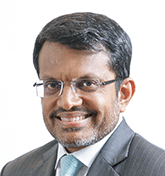

Steve Waygood, chief responsible investment officer at Aviva Investors, said a focus on environment, society and governance data and reporting is a positive move but more needs to be done to change the structure of international finance in order to meet the climate targets of the Paris agreement.
Waygood spoke on a panel at a webinar hosted by the London Stock Exchange Group and PRI, Shifting the trillions: what data is needed?, part of a series related to the UN Climate Change Conference of the Parties (COP26) in Glasgow in November.
“A focus on reporting is good but is not a substitute for harnessing the profit motive and changing the governance structure of international financial,” he said. “We have seen coal, utilities and autos changing but we need to harness the profit motive by making the polluter pay.”
Really looking forward to this PRI/LSEG event. How far the mandatory ESG disclosure debate has come in last seven months since the US election. Arguably further than the previous twenty years combined…. https://t.co/BOUfnUwOKJ
— Steve Waygood (@stevewaygood) June 26, 2021
Waygood argued that there has too much focus in assuming that improving ESG disclosure leads to different capital allocation decisions.
“The greatest part of the climate challenge isn’t allowing investors to price securities better,” he added. “It is the changing the market structure that leads to suboptimal outcomes for society that could actually destroy civilization by the end of the century. That is not hyperbolic but what the science is telling us.”
He said prudential rules need to change more rapidly to ensure that finance flows towards climate mitigation and adaptation solutions and away from fossil fuels. In the UK investors are encouraging a change by the Monetary Policy Committee at the Bank of England to include climate change recommendations and Rishi Sunak, the Chancellor, has written to the governor of the central bank.
“If we were to get all the G20 finance ministers to mirror that within their national jurisdictions that would be wonderful,” he added. “Modern portfolio theory neglects to factor in that returns made in one time period can increase risk for future time periods and drive down the efficient portfolio frontier.”

Steve Waygood, Aviva Investors
However, Waygood remained optimistic that the parabolic rate of change in the last two years, and particularly since the US election last November, could be sufficient to deliver net zero if the same rate of change continues throughout his decade and beyond.
He highlighted voluntary actions such as the new Glasgow Financial Alliance for Net Zero, chaired by Mark Carney, UN Special Envoy on Climate Action and Finance. The alliance brings together more than160 firms with $70 trillion in assets and net-zero initiatives from across the financial system to accelerate the transition to net-zero emissions by 2050 at the latest. Existing and new net zero finance initiatives will be part of the alliance, including the Net Zero Asset Managers Initiative, the UN-convened Net-Zero Asset Owner Alliance and the Net-Zero Banking Alliance.
US policy
Matthew Swinehart, director of the Office of International Financial Markets at U.S Department of the Treasury, said on a panel that the US is back in the fight against climate change and President Biden has announced the release of an international climate finance plan.
“It will provide the US government with an overarching strategy for international climate finance to support our 2050 net zero goals. ,” Swinehart said. “The President also signed an executive order this month on climate-related financial risks.”
the US is back in the fight against #climatechange, says Matthew Swinehart, Director of the Office of International Financial Markets at @USTreasury starting his speech #sustainablefinance #esg #climatecrisis #climatefinance @JeromeFosterII @GinaEPA @Michael_S_Regan pic.twitter.com/jik5PRtfJU
— Sri Event (@SriEvent) June 29, 2021
As a result Treasury Secretary Janet Yellen will engage with financial regulators on a range of issues including assessing ESG data gaps, the role of climate financial disclosures and tools to mitigate climate-related financial risks. The US Securities and Exchange Commission has also issued a request for public input on climate disclosures and will proposing new rules.
“The G7 finance ministers and central bank governors took an important step this month through their statement supporting moving toward mandatory climate-related financial disclosures which is a key building block,” Swinehart added.
The administration is also working with the Financial Stability Board to accelerate the implementation of climate-related disclosure frameworks that are based on the TCFD. The Task Force on Climate-Related Financial Disclosures issued a voluntary framework for reporting in 2017 which has been endorsed by more than 1,800 companies and 10 governments.
Swinehart said: “The task for us is to transition from a largely voluntary framework to public sector engagement or regulation. We will review existing international initiatives, many of which are lead by the private sector and have great support in the markets, along with approaches that jurisdictions may be taking with an aim to improve consistency and comparability across jurisdictions.”
Using technology
Ravi Menon, managing director at the Monetary Authority of Singapore, said in a keynote speech on the webinar that finance has a key role to play in supporting the to a greener and more sustainable trajectory but need trusted, timely and relevant data.
“Data is a critical foundation for the green economy the world needs to build but financial institutions need accurate granular data to assess and manage the environmental risks in their portfolios,” he added.
For example, they need geographical climate and weather related data on the assets, as well as along the supply chain; data on firms’ carbon footprints, historical carbon emissions and pathways to reduce emissions over time; data on energy use and efficiency of physical assets such as real estate, and data to monitor customers compliance to ESG standards and to measure the impact of transition activities on the climate.

Ravi Menon. MAS
“The demand for trusted data will only grow as regulators strengthen reporting and disclosure requirements yet availability remains a big challenge,” said Menon. “The process of ESG data acquisition is manual, cumbersome and costly.”
He continued there is also a lack of transparency in the verification and reporting process but Menon argued that technology can be a gamechanger in addressing these data challenges.
For example, fintechs can connect APIs to existing systems, such as waste management systems, to retrieve relevant environmental and energy consumption data more efficiently. Financial institutions are exploring the use of sensors to measure carbon emissions directly at source and satellite imagery is being used to track the progress of reforestation and carbon sequestration projects, which enables nature-based solutions.
Distributed ledger technology is also being considered to maintain provenance and traceability in the data. For example, IBM Food Trust uses the blockchain to connect participants across the food ecosystem, such as growers, processes, and retailers with data collected along the supply chain.
He highlighted Intensel, one of the winners of the Monetary Authority of Singapore’s fintech challenge, which uses artificial intelligence to analyse climate data and satellite imagery to assess the physical risks faced by assets to floods typhoons, storm surges and extreme heat
Fintechs can also offer tools to automate the reporting process, while being nimble enough to adapt to various standards, such as the Sustainable Accounting Standards Board.
Menon stressed that financial institutions cannot adopt a wait-and-see approach to disclosure and reporting requirements being formulated by governments and regulators.
“It is imperative that financial institutions step up efforts to collect the data that are necessary to mitigate their physical as well as transition risks as soon as possible,” he added.”We need to develop methodologies to translate raw data into quantifiable assessments of climate-related risks as the data to be collected and metrics that are relevant for each sector can differ greatly.”





